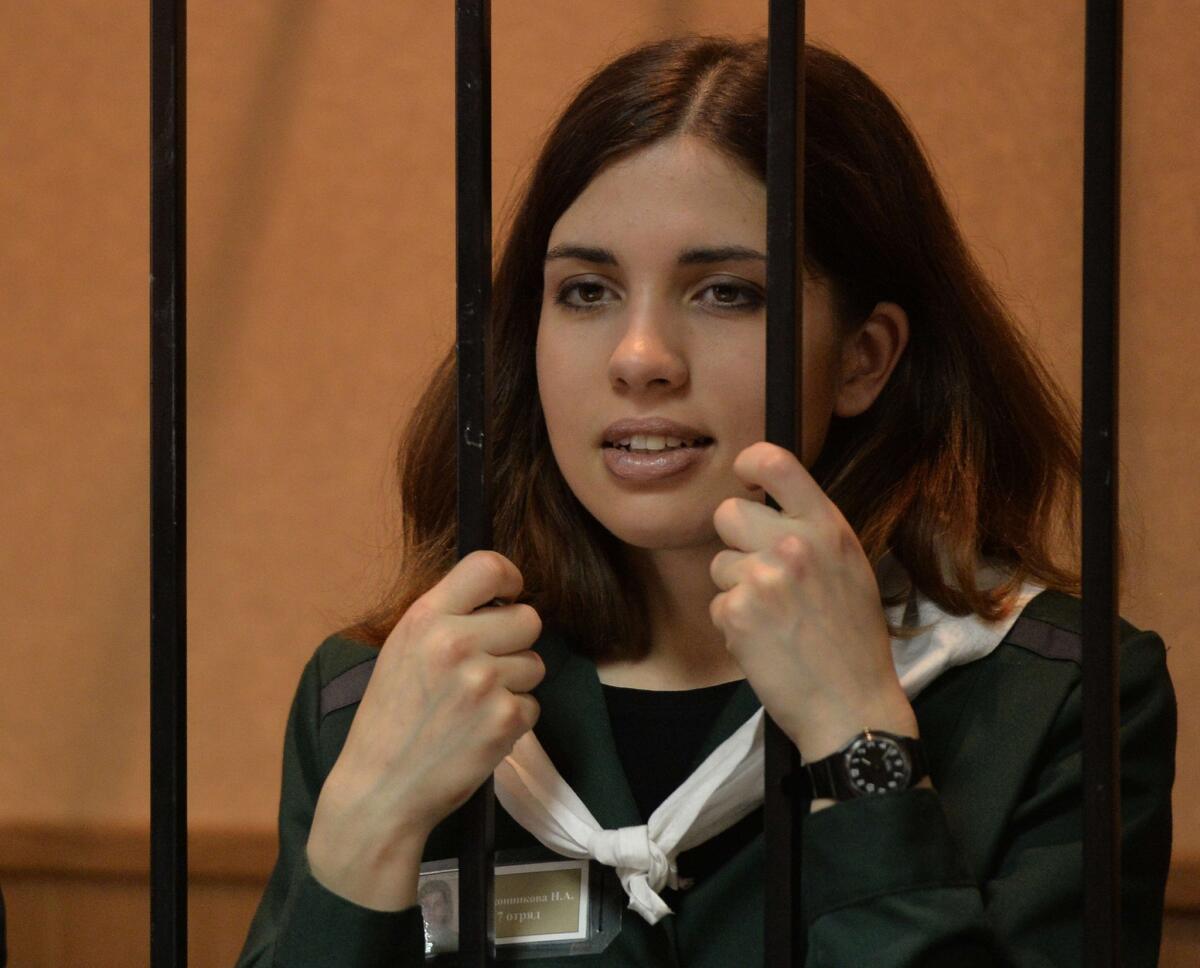Pussy Riot musician on hunger strike to protest prison conditions

MOSCOW -- A member of the punk rock group Pussy Riot went on a hunger strike Monday to protest what she said were unbearable conditions at a Russian prison camp.
“I demand that human rights be observed in the [prison] colony; I demand that this camp ... abide by the law,” Nadezhda Tolokonnikova wrote in an open letter distributed by her husband. “I demand that we be treated as humans and not as slaves.”
In late 2012, Tolokonnikova, 24, and two other members of Pussy Riot, Maria Alyokhina and Yekaterina Samutsevich, were each sentenced to two years of imprisonment for inciting religious hatred.
The three were arrested in February of that year after they staged what they called a “punk prayer” against Russian President Vladimir Putin at Christ the Savior Cathedral in central Moscow. The incident occurred at the height of the 2012 presidential campaign, which Putin went on to win.
During the appeals process, Samutsevich struck a deal with prosecutors and received a suspended sentence. Tolokonnikova and Alyokhina refused to acknowledge guilt and were sent to prison camps. They were both denied parole and have previously complained of mistreatment.
Tolokonnikova has been in a camp about 300 miles east of Moscow, where prisoners are forced to work 16 hours a day for about $1 a month at a garment factory producing police uniforms.
“The most cruel regime, the longest working day, the most screaming lawlessness,” she said of her daily routine, comparing it to “an execution.”
She wrote that on her first day at the camp, she told the warden she would work only eight hours a day, as prescribed by the prison working code. The warden, she said, replied: “The code is a code, but the main thing is the production plan: If you don’t fulfill it, you stay for an extended time. And mark it: Down here, we’ve broken people tougher than you.”
Describing her work, she said: “Your hands are pierced and scratched by sewing needles, your blood spread across the table, but you are still trying to sew, because you are part of a conveyor production. And the damned machine tool keeps on breaking.”
She also described prison sanitary conditions as appalling and said that inmates are routinely fed stale bread, milk diluted with water, rancid millet and rotten potatoes.
Pussy Riot’s former lawyer, Mark Feygin, said that by protesting, Tolokonnikova might be making her situation worse.
“The Russian penal system inherited some horrible traits from Stalin’s gulag,” he said in an interview, “one of which is correction through obligatory physical labor, which turns prisoners into labor slaves. By coming out against the system, Tolokonnikova is risking sanctions that can make her life much harsher in camp.”
These could include being denied meetings with relatives, being put into solitary confinement and extending her prison term, which “through some provocation the administration can easily arrange.”
Tolokonnikova also recently complained to Russian penal authorities that the deputy camp warden had threatened to kill her.
“Nadezhda realizes what risks she is taking by coming out against the system,” her husband, Pyotr Verzilov, said in an interview. “But she is also aware that by her tough stand against injustice, Nadezhda draws the world’s attention to the horrible life and work conditions in Russian labor camps.”
Verzilov said Tolokonnikova had stopped eating food as of Monday morning and intended to stay on her hunger strike indefinitely.
Administrators of the Mordovia region penal system said the protest amounted to blackmailing camp officials because they wouldn’t give her unusual privileges, the Russian news agency RIA Novosti reported.
ALSO:
Hebron remains tense after shooting of Israeli soldier
Kenyan deputy president excused from crimes-against-humanity trial
Egyptian court bans Muslim Brotherhood, orders its assets confiscated
More to Read
Sign up for Essential California
The most important California stories and recommendations in your inbox every morning.
You may occasionally receive promotional content from the Los Angeles Times.










